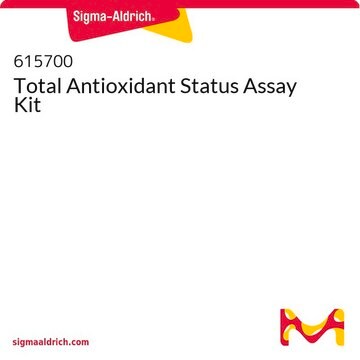MAK334
Antioxidant Assay Kit
sufficient for 100 colorimetric tests
Synonym(s):
Oxidative Stress Assay Kit, Total Antioxidant Capacity Assay Kit
About This Item
Recommended Products
usage
sufficient for 100 colorimetric tests
input
biological sample(s)
plasma
food(s)
serum
urine
beverage(s)
saliva
application(s)
cosmetics
food and beverages
pharmaceutical
detection method
colorimetric
relevant disease(s)
Alzheimer′s disease; Parkinson′s disease; diabetes; neurological disorders
Related Categories
General description
Application
- Cancer Research
- Diabetes Research
- Drug Discovery
- Neurodegenerative Disease Research
- Oxidative Stress Research
Features and Benefits
Simplified Process: Experience a streamlined process with the addition of only a single working reagent and a 10 minute room temperature reaction, reducing complexity and saving valuable time and effort.
Compatibility with High-Throughput Systems: Easily incorporate our kit into high-throughput handling systems, ensuring smooth and accurate processing, enhancing efficiency in your laboratory workflow.
Suitability
Principle
Other Notes
Storage Class Code
10 - Combustible liquids
Flash Point(F)
188.6 °F
Flash Point(C)
87 °C
Certificates of Analysis (COA)
Search for Certificates of Analysis (COA) by entering the products Lot/Batch Number. Lot and Batch Numbers can be found on a product’s label following the words ‘Lot’ or ‘Batch’.
Already Own This Product?
Find documentation for the products that you have recently purchased in the Document Library.
Customers Also Viewed
Our team of scientists has experience in all areas of research including Life Science, Material Science, Chemical Synthesis, Chromatography, Analytical and many others.
Contact Technical Service




